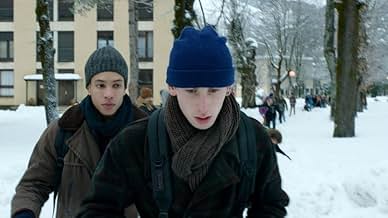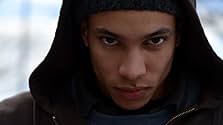Damien lebt bei seiner Mutter Marianne, einer Ärztin, während sein Vater im Auslandseinsatz ist. Er wird von Thomas gemobbt, dessen Mutter krank ist. Die Jungen finden schließlich doch noch ... Alles lesenDamien lebt bei seiner Mutter Marianne, einer Ärztin, während sein Vater im Auslandseinsatz ist. Er wird von Thomas gemobbt, dessen Mutter krank ist. Die Jungen finden schließlich doch noch zusammen, als Marianne Thomas dazu einlädt, zu ihnen zu kommen und bei ihnen zu bleiben.Damien lebt bei seiner Mutter Marianne, einer Ärztin, während sein Vater im Auslandseinsatz ist. Er wird von Thomas gemobbt, dessen Mutter krank ist. Die Jungen finden schließlich doch noch zusammen, als Marianne Thomas dazu einlädt, zu ihnen zu kommen und bei ihnen zu bleiben.
- Regie
- Drehbuch
- Hauptbesetzung
- Auszeichnungen
- 2 Gewinne & 12 Nominierungen insgesamt
Empfohlene Bewertungen
What made this movie work in my opinion is the subplot involving Damien's mother played very well by Sandrine Kiberlain who gives a subtle performance. The standout to me in terms of acting is without a doubt Corentin Fila as Thomas Chardoul, the perplexed, confused and prone to violence teenager who keeps everyone at bay while yearning to be himself.
I must say I also enjoyed Kacey Mottet Klein's performance as Damien Delille even though he seemed a bit less able to convey the angst and subtle emotions needed for the part. His acting was sometimes clumsy and a bit fake but is still worked because it could be read as choices he made on how to play the part and the fact that he truly is a teenager playing one, not an adult actor trying to go back to his youth.
Even the ending worked for me so a strong 8 star rating is what I felt it deserved and if you speak French and want to spend some time getting to know these characters, they all have something to offer and I for one enjoyed the journey and can safely recommend it warmly.
If you're not gay, you might think this movie is nothing special, the way some straight people I know thought Brokeback Mountain was tripe, not paying any attention to the repression central to that story. The moving qualities in this film are mostly a coming-out thing, so perhaps straight people won't relate, but there are glimmers here (and in our times) of that narrative holding enough substance to speak to universal truths.
The beautiful location enhances the charm and depth of this moving film. In addition to the story of the two boys, there are subplots in each of their families that add greatly to the story overall. While the story of the boys' conflict seems to linger too long, the movie can be credited for being unpredictable and full of surprises.
The characterization of Tomas is particularly rich and filled with contradictions. In one moment, it is easy to despise him for his bullying ways; in the next moment, it is easy to pity him for his difficult daily life and the uncertainty due to a change that is about to happen in his family. Though not explicitly explored, he also has the difficulty of seeming to be the only non-white person in the small town.
The actors are both great in their roles as is Sabine Kiberlain who plays Damien's mother and is also a doctor. She's very nurturing in both roles and is also quite touching as someone in a crisis in the movie's second half.
By the film's end, one has compassion for all of its characters. - dbamateurcritic.
The trouble with Damien's attraction to Thomas is that the latter bullies the former. But when Marianne, the local doctor in the Pyrenean community, hospitalises Thomas' weak, pregnant mother, she invites him to stay with her and Damien, and so the two boys are thrown together...
There are occasions when this film loses the way: Damien and Thomas are plainly the centre of the story, so sequences focusing exclusively on Marianne seem pointless and add little to the main story. But Kiberlain certainly provides a decent performance as the friendly mother who chats happily to the boys while serving them a glass of after-school wine (did I mention this is a French film?), before a personal tragedy means she must pull her life back together. Fila and Klein are given likable characters to play - Thomas concerned by his mother's condition; Damien the bully's victim - and also turn in good performances.
But the best aspect for me is the scenery: director André Téchiné gets the best of filming in the Pyrénées, with the endless snow-covered mountains (most of the filming seems to have taken place during the depths of winter) gradually giving way to deep, verdant valleys as the film and seasons progress. But it is not just a travelogue - this film is well worth seeing for its take on awakening sexuality.
The boy is Thomas Charpoul (Corentin Fila), a biracial Algerian boy of seventeen who has been adopted by a white farming family and whose feeling of alienation from his parents, Jacques (Jean Fornerod, "Polisse") and Christine (Mama Prassinos, "Leaving") carries over to his behavior at school. Usually, one of the last to be picked for a basketball team in gym class, Tom's anger finds an outlet when he deliberately provokes another classmate Damien Delille (Kacey Mottet Klein, "Keeper"), tripping him as he goes back to his seat after reciting a poem by Rimbaud in front of the class and shoving him to the ground after school.
Damien is a tall, slender boy who could not be more different than his nemesis. He is a committed student, emotionally stable, and close to his mother Marianne (Sandrine Kiberlain, "Encore Heureux"), the only doctor in the small town. As performed by Kiberlain, she is a three-dimensional figure whose warmth and humor light up the screen and the film is her story as well as that of the two boys. Damien's father Nathan (Alexis Loret, "In Harmony"), is an Army pilot who is engaged in an unspecified conflict in the Middle East, but is away from home often and but plays a strong role in the Damien's life. Not cowed, Damien takes lessons in self defense from family friend Paulo (Jean Corso, "In the Name of my Daughter") and plans to retaliate but circumstances change the dynamics.
When Marianne visits Christine to treat her pulmonary infection, she discovers that her patient is pregnant. Unaware of the conflict between the boys, she invites Thomas to stay at their house during his mother's pregnancy so that he can keep up his grades. While on the surface it is a decision that seems contrived except that Marianne has dreams about having an affair with Tom. Though the violence between the boys continues even as they share the same house, Damien recognizes new feelings when he sees Tom take off his clothes and dive naked into a lake in the middle of winter.
Startled by his physical attraction, he tells him later that "I need to know if I'm into guys or just to you," but the answer remains unclear and their homoerotic relationship only develops after an initial period of fear and confusion. What stands out in Being 17 is the naturalness of the two boys and the chemistry they have together. This authenticity extends not only to the way they speak to each (neither are very vocal) or look at each other but to their body language even when they are fighting, as if they are happy to be receiving the others attention. Not enough can be said about the work of Klein and Fila. Their performances resonate with conviction and create a uniquely moving experience.
Wusstest du schon
- WissenswertesThe film's title is derived from the first verse of Arthur Rimbaud's 1870 poem "Roman": "On n'est pas sérieux quand on a dix-sept ans" ("When you are seventeen you aren't really serious"). Additionally, the poster's tagline, "L'adolescence est le seul temps où l'on ait appris quelque chose" ("Adolescence is the only period in which we learn anything") is taken from "In the Shadow of Young Girls in Flower", the second volume in Marcel Proust's novel "In Search of Lost Time". Both Rimbaud and Proust were known to be homosexual.
- PatzerAt one point, Damien changes the clock and explains that he is setting it for daylight savings time, but he moves the clock back. He should be moving it forward by an hour.
- VerbindungenReferences Nackte Kindheit (1968)
- SoundtracksYafaké
performed by Victor Démé
Top-Auswahl
- How long is Being 17?Powered by Alexa
Details
Box Office
- Budget
- 5.500.000 € (geschätzt)
- Bruttoertrag in den USA und Kanada
- 52.713 $
- Eröffnungswochenende in den USA und in Kanada
- 8.838 $
- 9. Okt. 2016
- Weltweiter Bruttoertrag
- 2.050.766 $
- Laufzeit1 Stunde 54 Minuten
- Farbe
- Seitenverhältnis
- 1.85 : 1
Zu dieser Seite beitragen
























